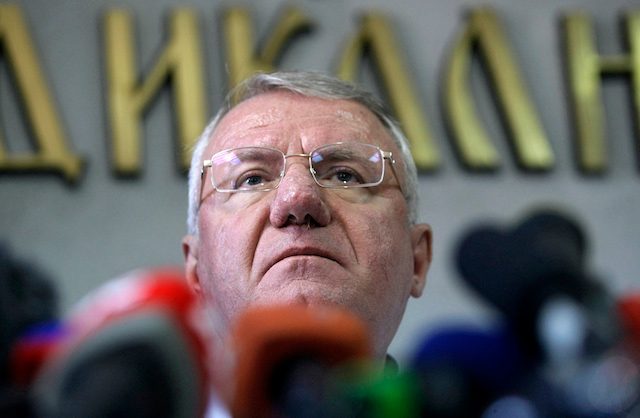SUMMARY
This is AI generated summarization, which may have errors. For context, always refer to the full article.

THE HAGUE, The Netherlands – Legal experts and historians have reacted with outrage to the controversial war crimes acquittal of firebrand Serb Vojislav Seselj, saying it overturns international law and rewrites the history of the Balkans conflict.
“The decision of the majority (judges) is divorced from the reality of what was happening in Croatia and Bosnia,” former top US diplomat on war crimes issues, Stephen Rapp, told Agence France-Presse.
No stranger to complex cases, having led the prosecution of ex-Liberian president Charles Taylor, Rapp said he was very “disappointed” that Seselj was on Thursday found not guilty of nine charges of war crimes and crimes against humanity.
The majority ruling by a three-judge panel at the International Criminal Tribunal for the former Yugoslavia (ICTY) departed “from established law and accepted practises of fact-finding,” said Rapp, now an expert with the Hague Global Institute for Justice, a think tank.
Seselj, once a firebrand paramilitary leader, had been charged with murder, persecution and torture of non-Serb civilians by being allegedly a member of a “joint criminal enterprise” along with the late Serbian president Slobodan Milosevic.
But in essence, the judges found that Seselj was a politician who ardently supported his vision of a Greater Serbia, but was not a criminal.
The judges also tossed aside decades of international law by saying “the crimes happened in an atmosphere of war, and this justifies them,” Balkans expert Eric Gordy told AFP.
“This is simply in conflict with the law,” added Gordy, a senior lecturer on Southeast European politics at University College London.
Chief ICTY prosecutor Serge Brammertz is already studying the judgement to see if there are grounds for appeal, and said many of the judges’ arguments were “absolutely not in line with the factual reality.”
‘No reasoning’
Dissenting judge Flavia Lattanzi, in an unusually strong opinion, said her two colleagues had used “insufficient reasoning, or no reasoning at all” to support their acquittal of Seselj, “in contravention” of the court’s rules.
Read by French judge Jean-Claude Antonetti, the judgement acquitted Seselj of any wrongdoing during the period of the indictment between August 1991 and September 1993.
“The prosecution failed to prove beyond all reasonable doubt that there was a widespread and systematic attack against the non-Serb civilian population in large areas of Croatia and Bosnia-Hercegovina,” Antonetti said.
He specifically mentioned Vukovar, a Croatian town razed by Serb forces in November 1991, and Zvornik where some 40,000 non-Serb Bosnians were expelled by paramilitary groups in 1992.
The judges could not rule out that the buses used to transport non-Serbs away from Serb-claimed territories “were in fact provided on humanitarian grounds,” Antonetti said.
As for Seselj’s inflammatory speeches such as urging Serb forces attacking Vukovar “to spare no one,” he was “participating in the war effort by galvanising the Serb forces,” the judges concluded.
The historical facts outlined by the judges “conflict with what the tribunal has found and what researchers and others know about what happened,” said Gordy, the Balkans expert.
He highlighted in particular the finding that there was no sustained attack on civilians in the Croatian town of Vukovar. “This is an impossible claim,” said Gordy.
‘Revisionism’
Vukovar suffered a three-month long siege before being captured by Serb forces in November 1991. The hospital was heavily shelled throughout the siege, but stayed open, coping with desperate conditions including a lack of medicines, electricity, food and water.
In late November 1991, Serb soldiers bused some 400 wounded Croats and other non-Serbs from the hospital to nearby Ovcara. Some 260 of them were taken to a secluded pig farm, where they were beaten, killed and buried in mass graves.
Seselj was acquitted of murder as a war crime for the massacre committed by volunteers known as “Seselj’s men” as the judges found he had no “hierarchical” responsibility for his militiamen.
“This kind of historical revision is quite simply unacceptable,” said Niccolo Figa-Talamanca, head of the No Peace Without Justice non-governmental organisation.
The judges had said “their role is not to establish the entire truth about the events that occurred; this may be true, but their role is equally not to deny the truth.”
Noted author and Balkans expert, Jelena Subotic, writing for the EU-backed Balkans Transitional Justice initiative, denounced Thursday’s verdict as “an embarrassment.”
“The Seselj verdict so fundamentally changes the interpretation of the character of the Yugoslav wars that it flips the main causal chain of events completely backwards,” she said. – Jo Biddle, AFP/Rappler.com
Add a comment
How does this make you feel?
There are no comments yet. Add your comment to start the conversation.